- Home
- T. Kingfisher
The Halcyon Fairy Book Page 2
The Halcyon Fairy Book Read online
Page 2
Never, ever, ever grant the last wishes of people with known magical associates.
Then the soldier pulled out his pipe and lit it with the blue light. As soon as a few rings of smoke had risen, the dwarf was standing there. He had a cudgel in his hand and said, “What does my master command?”
“Strike the false judges and their henchmen to the ground for me. And don’t spare the king either, who has treated me so badly.”
I will give you that the king was a dick about the pensions, and if you want to strike him down, I’m willing to turn a blind eye. But the judges nailing you for kidnapping really don’t qualify as “false” and let me point out that you thought they were good enough for the witch (who increasingly has my sympathy.)
Then the dwarf took off like lightning, zip-zap, back and forth, and everyone he even touched with his cudgel fell to the ground and did not dare to move. The king became afraid. He begged for mercy, and in order to save his life, he gave to the soldier his kingdom as well as his daughter for a wife
I bet she was thrilled.
The Master-maid
Okay, I had fun with the last one, and apparently people enjoyed it, so without further ado, “The Master-maid.” This one is from The Blue Fairy Book by Andrew Lang (London: Longmans, Green, and Co., 1889) and was collected in Norway in the mid 1800s. It’s one of Aarne-Thompson Type 313 (which is broadly tales of magical flight from a supernatural opponent).
ONCE upon a time there was a king who had many sons. I do not exactly know how many there were, but the youngest of them could not stay quietly at home, and was determined to go out into the world and try his luck, and after a long time the King was forced to give him leave to go.
Well, that’s a pretty standard opening, although I do like the “I do not know how many there were,” rather than a bald number.
When he had traveled about for several days, he came to a giant’s house, and hired himself to the giant as a servant.
This is a bad move. Giants are always bad. Fairies can go either way, dwarves can go either way, but witches and giants are always bad. Once in a blue moon you might get a helpful Baba Yaga, but only if you’re not a dumbass.
In the morning the giant had to go out to pasture his goats, and as he was leaving the house he told the King’s son that he must clean out the stable. “And after you have done that,” he said, “you need not do any more work today, for you have come to a kind master, and that you shall find. But what I set you to do must be done both well and thoroughly, and you must on no account go into any of the rooms which lead out of the room in which you slept last night. If you do, I will take your life.”
“Well to be sure, he is an easy master!” said the Prince to himself as he walked up and down the room humming and singing, for he thought there would be plenty of time left to clean out the stable, “but it would be amusing to steal a glance into his other rooms as well,” thought the Prince, “for there must be something that he is afraid of my seeing, as I am not allowed to enter them.”
The fact that the giant just told him that he’d kill him if he went into the other rooms and the Prince still thinks he’s an easy master without irony kinda makes me wonder what the Prince’s home life was like. That’s seriously not normal.
So he went into the first room. A cauldron was hanging from the walls; it was boiling, but the Prince could see no fire under it. “I wonder what is inside it,” he thought, and dipped a lock of his hair in, and the hair became just as if it were all made of copper. “That’s a nice kind of soup. If anyone were to taste that his throat would be gilded,” said the youth, and then he went into the next chamber.
Personally I always sample soup with my hair first.
There, too, a cauldron was hanging from the wall, bubbling and boiling, but there was no fire under this either. “I will just try what this is like too,” said the Prince, thrusting another lock of his hair into it, and it came out silvered over. “Such costly soup is not to be had in my father’s palace,” said the Prince, “but everything depends on how it tastes,” and then he went into the third room. There, too, a cauldron was hanging from the wall, boiling, exactly the same as in the two other rooms, and the Prince took pleasure in trying this also, so he dipped a lock of hair in, and it came out so brightly gilded that it shone again. “Some talk about going from bad to worse,” said the Prince, “but this is better and better. If he boils gold here, what can he boil in there?”
As this is never mentioned again anywhere in the story, I envision the prince going through the rest of the plot with weird three-tone metallic hair, and possibly 80s shoulder-pads as well.
He was determined to see, and went through the door into the fourth room. No cauldron was to be seen there, but on a bench someone was seated who was like a king’s daughter, but, whosoever she was, she was so beautiful that never in the Prince’s life had he seen her equal.
“Oh! in heaven’s name what are you doing here?” said she who sat upon the bench. “I took the place of servant here yesterday,” said the Prince.
“May you soon have a better place, if you have come to serve here!” said she.
“Oh, but I think I have got a kind master,” said the Prince. “He has not given me hard work to do today. When I have cleaned out the stable I shall be done.”
Back home, we shoveled stables all day, with our tongues! Then they beat us and then we drew straws for who got eaten by weasels that night! This place is awesome! Nobody’s waved a weasel at me in a threatening manner at all!
“Yes, but how will you be able to do that?” she asked again. “If you clean it out as other people do, ten pitch forksful will come in for every one you throw out. But I will teach you how to do it; you must turn your pitchfork upside down, and work with the handle, and then all will fly out of its own accord.”
This doesn’t work in my garden. I’ve tried.
“Yes, I will attend to that,” said the Prince, and stayed sitting where he was the whole day, for it was soon settled between them that they would marry each other, he and the King’s daughter, so the first day of his service with the giant did not seem long to him.
I sort of wonder at this point whether she’s agreeing to marry the first guy who comes along in hopes of getting free of the giant, or if the giant has killed ten or twenty princes and she’s been waiting until one came along who tickled her fancy.
But when evening was drawing near she said that it would now be better for him to clean out the stable before the giant came home. When he got there he had a fancy to try if what she had said were true, so he began to work in the same way that he had seen the stable-boys doing in his father’s stables, but he soon saw that he must give up that, for when he had worked a very short time he had scarcely any room left to stand.
I do approve of the fact that he’s actually testing this, rather than just accepting straight out that it’s magic manure.
So he did what the Princess had taught him, turned the pitch-fork round, and worked with the handle, and in the twinkling of an eye the stable was as clean as if it had been scoured. When he had done that, he went back again into the room in which the giant had given him leave to stay, and there he walked backward and forward on the floor, and began to hum and sing.
Then came the giant home with the goats. “Have you cleaned the stable?” asked the giant. “Yes, now it is clean and sweet, master,” said the King’s son.
“I shall see about that,” said the giant, and went round to the stable, but it was just as the Prince had said.
“You have certainly been talking to my Master-maid, for you never got that out of your own head,” said the giant.
The funny thing about this is that the giant is going to say this every time, and yet at no point does he ever do anything about it. Also, apparently the King’s daughter is the Master-maid, and shall henceforth be known as such, even though I get a totally weird cross-dressing vibe out of that, myself.
“Master-maid! What kind of a thing is
that, master?” said the Prince, making himself look as stupid as an ass. “I should like to see that.”
“Well, you will see her quite soon enough,” said the giant.
On the second morning the giant had again to go out with his goats, so he told the Prince that on that day he was to fetch home his horse, which was out on the mountain side, and when he had done that he might rest himself for the remainder of the day, “for you have come to a kind master, and that you shall find,” said the giant once more. “But do not go into any of the rooms that I spoke of yesterday, or I will wring your head off,” said he, and then went away with his flock of goats.
“Yes, indeed, you are a kind master,” said the Prince.
Oh, well, sure, he threatened to wring my head off, but still, what a guy! Back home we were beaten with live hedge-hogs for sneezing! This place is like a resort!
“but I will go in and talk to the Master-maid again perhaps before long she may like better to be mine than yours.” So he went to her. Then she asked him what he had to do that day.
“Oh! not very dangerous work, I fancy,” said the King’s son. “I have only to go up the mountain side after his horse.”
You would think after the bit with the stables it might occur to him to be just a teensy bit suspicious.
“Well, how do you mean to set about it?” asked the Master-maid.
“Oh! there is no great art in riding a horse home,” said the King’s son. “I think I must have ridden friskier horses before now.”
That’s how we lost the last six princes. The three before that didn’t figure out the pitchfork trick and suffocated in manure.
“Yes, but it is not so easy a thing as you think to ride the horse home,” said the Master-maid, “but I will teach you what to do. When you go near it, fire will burst out of its nostrils like flames from a pine torch; but be very careful, and take the bridle which is hanging by the door there, and fling the bit straight into his jaws, and then it will become so tame that you will be able to do what you like with it.” He said he would bear this in mind, and then he again sat in there the whole day by the Master-maid, and they chatted and talked of one thing and another, but the first thing and the last now was, how happy and delightful it would be if they could but marry each other, and get safely away from the giant and the Prince would have forgotten both the mountain side and the horse if the Master-maid had not reminded him of them as evening drew near, and said that now it would be better if he went to fetch the horse before the giant came. So he did this, and took the bridle which was hanging on a crook, and strode up the mountain side, and it was not long before he met with the horse, and fire and red flames streamed forth out of its nostrils. But the youth carefully watched his opportunity, and just as it was rushing at him with open jaws he threw the bit straight into its mouth, and the horse stood as quiet as a young lamb, and there was no difficulty at all in getting it home to the stable. Then the Prince went back into his room again, and began to hum and to sing.
Three-tone metallic hair, and he sings. Did anybody ever see the video for “You Spin Me Round?”
Toward evening the giant came home. “Have you fetched the horse back from the mountain side?” he asked.
“That I have, master, it was an amusing horse to ride, but I rode him straight home, and put him in the stable too,” said the Prince.
“I will see about that,” said the giant, and went out to the stable, but the horse was standing there just as the Prince had said. “You have certainly been talking with my Master-maid, for you never got that out of your own head,” said the giant again.
Normally the hero’s a bit of an idiot, but the fact that the giant KNOWS that there is fraternizing and hasn’t stopped it does not speak well of the villain either.
“Yesterday, master, you talked about this Master-maid, and today you are talking about her, ah, heaven bless you, master, why will you not show me the thing? for it would be a real pleasure to me to see it,” said the Prince, who again pretended to be silly and stupid.
“Oh! you will see her quite soon enough,” said the giant.
On the morning of the third day the giant again had to go into the wood with the goats. “Today you must go underground and fetch my taxes,” he said to the Prince. “When you have done this, you may rest for the remainder of the day, for you shall see what an easy master you have come to,” and then he went away.
“Well, however easy a master you may be, you set me very hard work to do,” thought the Prince.
Finally!
“but I will see if I cannot find your Master-maid; you say she is yours, but for all that she may be able to tell me what to do now,” and he went back to her. So, when the Master-maid asked him what the giant had set him to do that day, he told her that he was to go underground and get the taxes.
“And how will you set about that?” said the Master-maid.
“Oh! you must tell me how to do it,” said the Prince, “for I have never yet been underground, and even if I knew the way I do not know how much I am to demand.”
The prince has definitely learned his lesson on this one. This is so rare in fairy tales and in princes that we must be quite impressed.
“Oh! yes, I will soon tell you that you must go to the rock there under the mountain ridge, and take the club that is there, and knock on the rocky wall,” said the Master-maid. “Then someone will come out who will sparkle with fire; you shall tell him your errand, and when he asks you how much you want to have you are to say: `As much as I can carry.’”
“Yes, I will keep that in mind,” said he, and then he sat there with the Master-maid the whole day, until night drew near, and he would gladly have stayed there till now if the Master-maid had not reminded him that it was time to be off to fetch the taxes before the giant came.
So he set out on his way, and did exactly what the Master-maid had told him. He went to the rocky wall, and took the club, and knocked on it. Then came one so full of sparks that they flew both out of his eyes and his nose. “What do you want?” said he.
“I was to come here for the giant, and demand the tax for him,” said the King’s son. “How much are you to have then?” said the other.
“I ask for no more than I am able to carry with me,” said the Prince.
“It is well for you that you have not asked for a horse load,” said he who had come out of the rock. “But now come in with me.”
I suspect that I am not alone in really wanting to know what would have happened if he’d asked for a horse load. Would they eat him? Turn him into a horse to carry it all? Sadly, this goes unanswered. We are also somewhat tantalized by what exactly the “one” that comes out of the rock wall is. Curse you, vague Norwegian folklorists!
This the Prince did, and what a quantity of gold and silver he saw! It was lying inside the mountain like heaps of stones in a waste place, and he got a load that was as large as he was able to carry, and with that he went his way. So in the evening, when the giant came home with the goats, the Prince went into the chamber and hummed and sang again as he had done on the other two evenings.
“Have you been for the tax?” said the giant. “Yes, that I have, master,” said the Prince.
“Where have you put it then?” said the giant again.
“The bag of gold is standing there on the bench,” said the Prince.
“I will see about that,” said the giant, and went away to the bench, but the bag was standing there, and it was so full that gold and silver dropped out when the giant untied the string.
“You have certainly been talking with my Master-maid!” said the giant, “and if you have I will wring your neck.”
Always with the neck-wringing …
“Master-maid?” said the Prince, “yesterday my master talked about this Master-maid, and today he is talking about her again, and the first day of all it was talk of the same kind. I do wish I could see the thing myself,” said he.
“Yes, yes, wait till tomorrow,” said the gian
t, “and then I myself will take you to her.”
“Ah! master, I thank you — but you are only mocking me,” said the King’s son.
Next day the giant took him to the Master-maid. “Now you shall kill him, and boil him in the great big cauldron you know of, and when you have got the broth ready give me a call,” said the giant, then he lay down on the bench to sleep, and almost immediately began to snore so that it sounded like thunder among the hills.
Sooner or later all fairy tales descend into cannibalism.
The interesting thing here is that the giant obviously trusts the Master-maid to carry this out, despite the fact that he knows she’s been giving the prince advice. Has he got something on her? She can’t be under a geas, as we’ll shortly see. Does he think she’s too scared to defy him? Does he still believe, despite evidence to the contrary, that she’s on his side?
… were they a thing? They might have been a thing. That’s unsettling. Might explain a few things, though.
We also note that he has absolutely no doubts that the Master-maid is capable of overpowering this young man without any help. This is the sort of thing that makes you go, “Whoa. The Master-maid is clearly a badass.”
So the Master-maid took a knife, and cut the Prince’s little finger, and dropped three drops of blood upon a wooden stool then she took all the old rags, and shoe soles, and all the rubbish she could lay hands on, and put them in the cauldron, and then she filled a chest with gold dust, and a lump of salt, and a water-flask which was hanging by the door, and she also took with her a golden apple, and two gold chickens, and then she and the Prince went away with all the speed they could.
You kinda get the impression that the Master-maid has thought her escape attempt through. Most fairy tales like this, the princess receives a series of magical items and they become useful in unexpected ways, sort of like the plot of Paycheck. The Master-maid, on the other hand, clearly has a checklist. “Golden chickens … check … lump of salt … check … ”

 Paladin's Strength
Paladin's Strength The Twisted Ones
The Twisted Ones The Hollow Places
The Hollow Places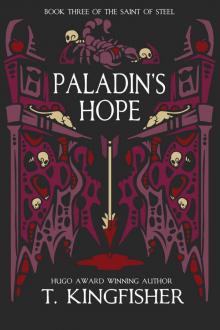 Paladin’s Hope: Book Three of the Saint of Steel
Paladin’s Hope: Book Three of the Saint of Steel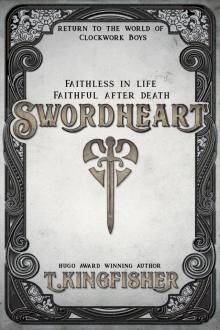 Swordheart
Swordheart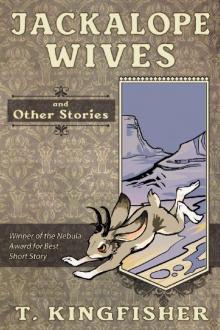 Jackalope Wives And Other Stories
Jackalope Wives And Other Stories A Wizard's Guide to Defensive Baking
A Wizard's Guide to Defensive Baking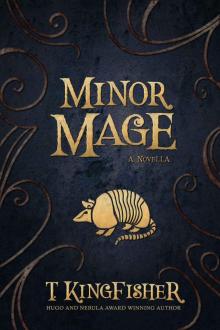 Minor Mage
Minor Mage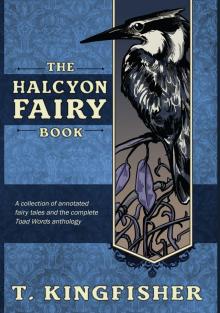 The Halcyon Fairy Book
The Halcyon Fairy Book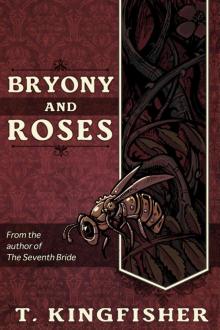 Bryony and Roses
Bryony and Roses The Wonder Engine_Book Two of the Clocktaur War
The Wonder Engine_Book Two of the Clocktaur War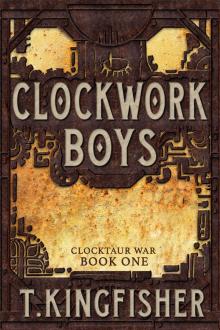 Clockwork Boys: Book One of the Clocktaur War
Clockwork Boys: Book One of the Clocktaur War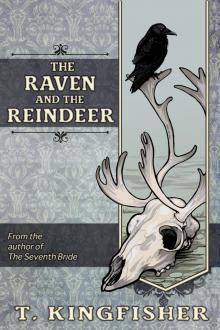 The Raven and the Reindeer
The Raven and the Reindeer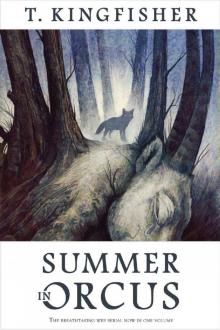 Summer in Orcus
Summer in Orcus The Wonder Engine
The Wonder Engine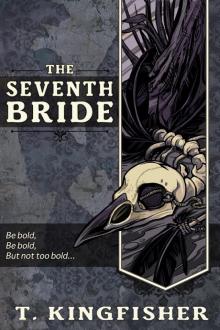 Seventh Bride
Seventh Bride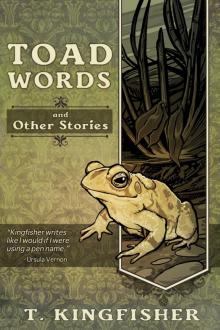 Toad Words
Toad Words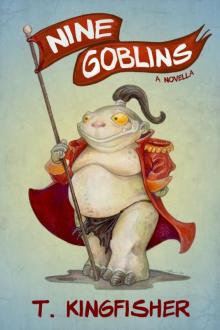 Nine Goblins
Nine Goblins